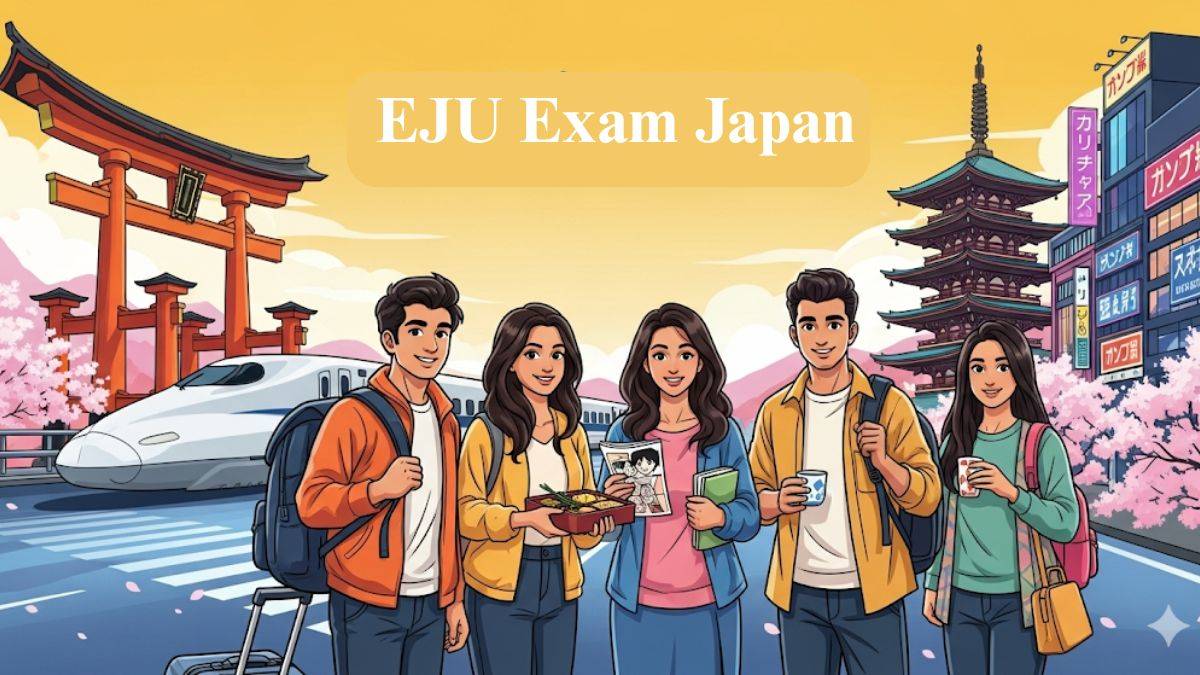Examination for Japanese University Admission for International Students
If you are an Indian student planning to study in Japan after class 12th, the EJU exam is a must-know step. The Examination for Japanese University Admission for International Students (EJU) evaluates your Japanese language skills and academic ability in science and math.
If you are an Indian student dreaming of pursuing higher studies in Japan after class 12th then the EJU exam is for you. Understanding everything about the Examination for Japanese University Admission for International Students (EJU) is important for you. EJU is a standardised test designed by the Japan Student Services Organisation (JASSO) to evaluate your Japanese language skills along with academic abilities in subjects such as science and mathematics.
This test is only for students who are not from Japan but want to study there. For most Japanese universities, EJU scores are a key requirement for admission and scholarship applications. In this article, you will find everything you need about the EJU exam, including eligibility, subjects, preparation tips, and how to use your results to study in Japan successfully.
- What is EJU?
- Who Should Take the EJU?
- EJU Exam Pattern
- How to Use Your EJU Score for Admission in Japanese Universities
What is EJU?
EJU stands for Examination for Japanese University Admission for International Students. The JASSO is the conducting body of this exam. Every year, JASSO organises this exam to assess the academic readiness of international students aiming for Japanese undergraduate programs.
| EJU Exam Overview for Indian Students | |
|---|---|
| Conducting Body | Japan Student Services Organisation (JASSO) through Mosai under Embassy of Japan, New Delhi |
| Exam Dates | November 9, 2025 (Sunday) |
| Exam Location | New Delhi |
| Exam Frequency | Twice a year (June and November) |
| Eligibility | Minimum qualification: Class 11 or higher |
| Exam Parts | Part 1: Japanese Language Proficiency (in Japanese) Part 2: Basic Academic Abilities (Mathematics, Science, Social Studies) in Japanese/English |
| Application Fee | INR 1,350 |
| Application Submission Period | July 7, 2025 to July 31, 2025 (until 5:00 pm) |
| Application Process | Online signup, email confirmation, fee payment via credit/debit card or net banking |
| Application Corrections | Allowed only by email before July 31, 2025; no changes permitted after |
| Result | Not specified in the source |
| Scholarship Opportunity | Top rank scorers eligible for scholarships (~¥52,000 per month) |
Predict your IELTS, TOEFL, and PTE in just 4 steps!
Who Should Take the EJU?
Any candidates completed their class 12th can apply for EJU exam. The detailed explanation of EJU eligibility requirements can be found below.
| EJU Japan Test Eligibility | |
|---|---|
| Eligibility | Indian and other international students who have completed Class 12 or equivalent |
| Age Limit | No strict limit, but usually for students aged 17 to 22 years |
| Who Can Apply | Students outside Japan who have completed or are completing upper secondary/vocational education |
| University Requirements | Some universities may have additional requirements depending on the program |
| Mandatory For | Most undergraduate admissions in Japanese universities |
| Subjects Required |
|
EJU Exam Pattern
| Subjects | Content Covered | Additional Details |
|---|---|---|
| Japanese as a Foreign Language | Reading comprehension, listening, and writing skills in Japanese | Tests comprehensive language skills needed for academic success |
| Science | Physics, Chemistry, Biology (Candidates choose two subjects) | Candidates select two subjects relevant to their intended field |
| Mathematics |
|
|
| Japan and the World (Social Studies) | Japanese culture, society, and international affairs | Focus on understanding Japan’s social and global context |
| Exam Schedule | Twice a year (June and November) |
|
How to Use Your EJU Score for Admission in Japanese Universities
Japanese universities generally require EJU scores for admission in UG courses. The scores vary by institution and program, but expect higher cut-offs for engineering, science, and competitive scholarships. Your result help determine your eligibility for government scholarships in Japan, such as the MEXT scholarship.
For help with university applications, students seeking to study abroad can contact our Shiksha Study Abroad Counsellors. The comments section below allows candidates to contact us as well.
Pick your stage and get free guidance from counsellors who've helped thousands get into top universities.
 Starting research
Starting research Shortlisting colleges
Shortlisting colleges Exam preparation
Exam preparation SOP/LOR writing
SOP/LOR writing Scholarship & finance
Scholarship & finance Visa application
Visa applicationThe University of Tokyo deadline for international students is Jan 1, 2027, for undergraduate admission. For admission to the graduate program, the University of Tokyo admission deadline vary most of the graduate programs.
Note: The University of Tokyo recommends students to submit respective applications, as early as possible, at-least 2-3 months in advance.
Yes, UTokyo is the best university in Japan. Shiksha ranks it #1 in the country as part of its the latest rankings. The university is also considered the best for programs like MS, MSN, LLM, MA, MFA, MIM, and MArch.
The Japan government actively helps fund the university's operations. This also helps UTokyo provide more affordable education to students.



PG students should hold a bachelor's degree to get admission to University of Tokyo. They should submit all the documents asked by the university. The requirements for Tokyo University is given below:
PG Requirements
Transcripts of all universities or college
GRE score
GPA score
Statement of purpose
Two Letters of Recommendation
Prior consultation proof (supervising professor)
English language requirements